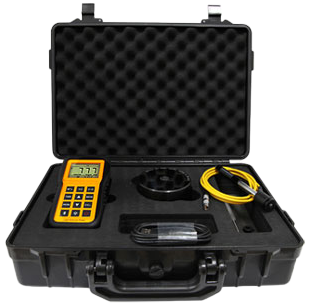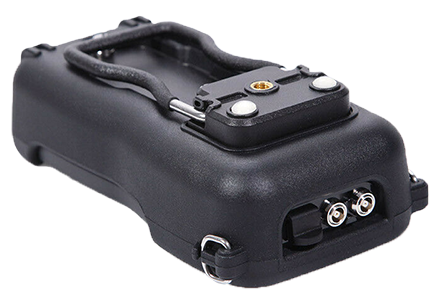The design of the DLH-100 is simple to use and is ruggedly built. It easily fits in your hand and is well protected by the black rubber boot included with the instrument. The large and bright LED display is sharp and easy to see in all working conditions. Results can be stored and sent to a PC at a later time or transmitted to a printer. A self-calibration feature allows the user to offset (+/-) a reading to match the hardness of a secondary standard made from your material and / or compensate for probe wear. The DLH-100 is a great value in a Leeb (Dynamic) Hardness Tester.
The keys are well positioned making it easy for the operator to select:
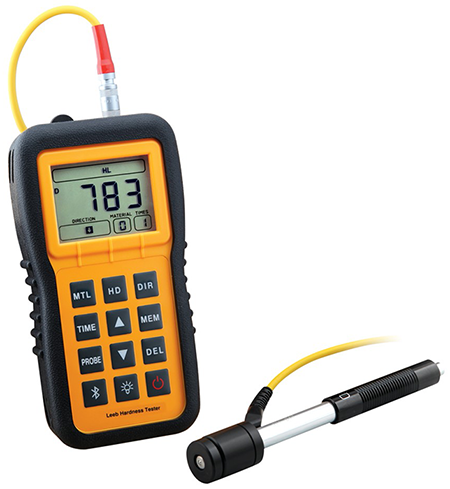
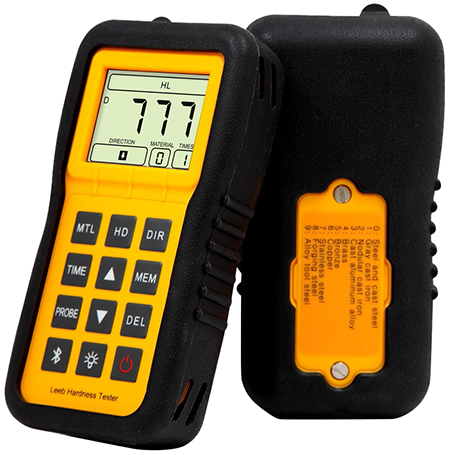
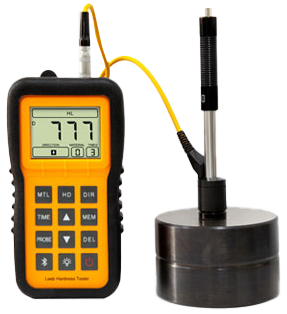
A spring in the probe projects the tungsten carbide ball tipped indenter at the test piece. Impact velocity is measured immediately prior to impact and then on rebound. The quotient is computed and displayed as the Leeb Hardness Value. On hard materials, the rebound velocity will be higher than that from softer materials, which will absorb more of the impact energy.
For a correct and repeatable measurement certain conditions must be met:
The test piece surface needs preparation by filing, sanding or grinding. As a general rule, if you drag your thumbnail across the surface and it drags, the surface is too rough.
Materials such as cast iron, that have a coarse (large) grain structure, will cause inconsistent measurements. The use of a much larger indenter "G" probe will often correct for this condition.
Test parts that have low mass or thickness need to be supported to prevent movement or deflection.
Selection of the material corrects for material type. The following material can be selected: Steel / Cast Steel, Gray Cast Iron, Nodular Cast Iron, Cast Aluminum, Brass, Bronze, Copper, Stainless Steel, Forged Steel and Tool Steel*
*Leeb measurements are affected by the material elasticity. To a large degree this is taken care of by selecting the most similar material type from the Material list. If you find that your measurements are a bit high or low, it is because the built-in correction factor does not match your material. You can try a different material to see if this gets you closer to a correct measurement. You can also use a known hardness sample of your test material (having enough mass and thickness) to determine the +/- error and then adjust the reading to match using the Calibration facility.
Set; Up, Down, Sideways, 45° up or 45° down.
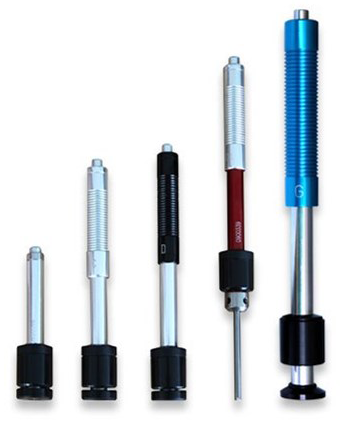
The DLH-100 is supplied with a type "D" General Purpose Probe. It can be used with types: D, DC, DL, C, D+15, E and G. The DLH-100 is compatible with most manufacturers' probes including EquoTip.
| Measuring Method | Leeb Hardness Method |
| Hardness Scale | HL, HB, HRB, HRC, HV, HS, σb |
| Measuring Range | HLD(200-960) HRC(19.8-68.5)HRB(13.5-100) HB(30-651)HV(80-976) HS(26.4-99.5)σb(375-2639) |
| Impact Device | D type impact device standard, optional C/G/DC/DL/D+15 |
| Accuracy | ±6HLD(HLD=800), Repeatability<6HLD(HLD=800) |
| Measuring Direction | 360 degree by manual setting |
| Materials | Steel&Cast Steel, Stainless Steel, GC iron, NC iron, Cast Aluminum alloy, Macht metal, Copper-tin alloy, Brass. |
| Resolution | 1HL,1HV,1HB,0.1HRB,0.1HRC,0.1HS |
| Display | High Contrast Segment Liquid Crystal Display (LED Backlight) |
| Data Memory | 100 groups (each group include 1-7 testing result and 1 MEAN value) |
| Communication | USB port (Standard) and Blue tooth (Optional) |
| Power | 2 AA batteries |
| Temperature | -10℃ to +50℃ |
| Size | 153mm×76mm×37mm(H×W×D) |
| Weight | 280g include batteries |
| Standard | GB/T 17394-1998, ASTM A956 |
